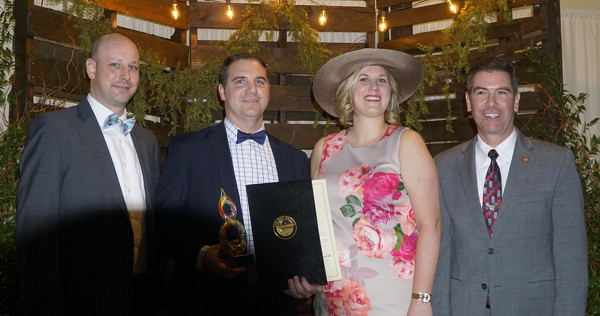Friday, March 8th, 2019
Farmers learn about data-driven eFields program
By Sydney Albert
CELINA - Data are increasingly used to provide insights on better farm management, and The Ohio State University's eFields program aims to help farmers further by providing data from field-scale research.
"In agriculture, you always are hearing about data and how much data we have. Every single piece of equipment you have is creating data; there are apps that are creating data. Hopefully you're keeping your fertilizer and pesticide records and those are data," said Elizabeth Hawkins, an OSU field and agronomic systems specialist.
Data are tools to be used, and properly collected and analyzed data can help farmers with a variety of management choices, such as crop variety selection or seeding prescriptions, Hawkins explained. To use data to their full potential, farmers must know what they want to get out of the data beforehand and then identify what data are needed to make a decision, collect and organize their information and interpret it.
The eFields program, in its third year of operation, can help farmers gather data to analyze their own fields and practices or can give farmers valuable information based on studies conducted at other farms. Farmers can view and download the yearly eFields reports online or request a hard copy with new reports released in January each year.
More than half the trials in the report are conducted in partnership with Ohio farmers. Hawkins said the partnerships give the eFields team the ability to find out what matters to Ohio farmers and what questions farmers would like to have answered and makes the studies more relevant to farmers. All studies are randomized and duplicated to ensure the results aren't just due to soil variation or due to specific conditions of a given year.
The 2018 eFields Report book contains information on more than 95 trials conducted in 25 counties on 5,624 acres. It contains information on variables such as corn and soybean seeding rates and nitrogen rates including economic analysis and the efficacy of high-speed planting and multihybrid planting equipment.
"We've got all this tech in ag and they're advertised to do cool things, so we like to get some of these technologies from companies we work with and test them out and see what they can do," Hawkins said.
Hawkins also showed videos featuring partner farmers and researchers explaining the process and results of their studies. One video discussed the effectiveness of starter manure. Hawkins said applying starter manure helps many farmers sleep better at night because they believe it helps them produce better yields. The case study on the farm in the video, however, showed the farmer was actually losing money for no return by applying starter fertilizer.
To learn more about the eFields program or download the 2018 eFields Report, go to go.osu.edu/eFields. If local farmers want to get involved, Hawkins said they can contact their local OSU extension educator or email digitalag@osu.edu.



